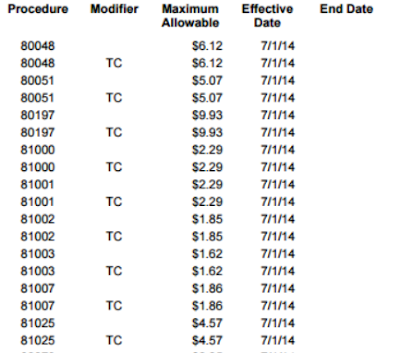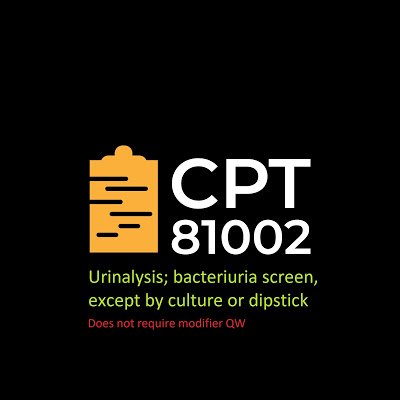CPT CODES and Description
81000 Urinalysis, by dip stick or tablet reagent for bilirubin, glucose, hemoglobin, ketones, leukocytes, nitrite, pH, protein, specific gravity, urobilinogen, any number of these constituents; non-automated, with microscopy
81001 – Urinalysis, by dip stick or tablet reagent for bilirubin, glucose, hemoglobin, ketones, leukocytes, nitrite, pH, protein, specific gravity, urobilinogen, any number of these constituents; automated, with microscopy- Fee schedule amount $3-$4
81002 – Urinalysis, by dip stick or tablet reagent for bilirubin, glucose, hemoglobin, ketones, leukocytes, nitrite, pH, protein, specific gravity, urobilinogen, any number of these constituents; non-automated, without microscopy Fee schedule amount $3-$4
81003 – Urinalysis, by dip stick or tablet reagent for bilirubin, glucose, hemoglobin, ketones, leukocytes, nitrite, pH, protein, specific gravity, urobilinogen, any number of these constituents; automated, without microscopy Fee schedule amount $3-$4
81005 Urinalysis, qualitative or semi-quantitative, except immunoassays Fee schedule amount $3-$4
81007 Urinalysis, bacteriuria screen, by non-culture, commercial kit Fee schedule amount $3-$5
81015 Urinalysis, microscopic only Fee schedule amount $3-$5
81025 Urine pregnancy test, by visualcolor comparison methods Fee schedule amount $8-$11
81050 Volume measurement for timed collection, each Fee schedule amount $4-$5

Indications and Limitations of Coverage and/or Medical Necessity
Urinalysis is one of the most useful indicators of health and disease, and is especially helpful in the detection of renal or metabolic disorders. It aids in diagnosing and following the course of treatment in diseases of the kidney and urinary system and in detecting disorders in other parts of the body such as metabolic or endocrinologic abnormalities in which the kidneys function normally.
The components of a urinalysis include an evaluation of physical characteristics (color, odor, and opacity); determination of specific gravity and pH; detection and measurement of protein, glucose, and ketone bodies; and examination of sediment for blood cells, casts, and crystals. Some laboratories include screening for leukocyte esterase and nitrate and do not perform a microscopic examination unless one of the chemical screening (macroscopic) tests is abnormal or unless a specific request for microscopic examination is made.
Diagnostic laboratory methods include visual examination; reagent strip screening; refractometry for specific gravity; and microscopic inspection of centrifuged sediment.
Urinalysis can be performed either by automated instruments or the use of tablets, tapes or dipsticks. Dipsticks are chemically impregnated reagent (reactive) strips that allow for quick determination of pH, protein, glucose, ketones, bilirubin, hemoglobin, nitrate, leukocyte esterase, and urobilinogen. The tip of the dipstick is impregnated with chemicals that react with specific substances in the urine to produce colored end products. Color standards are provided against which the actual color can be compared. The reaction rates of the impregnated chemicals are standard for each dipstick, and color changes must be matched at the correct time after each stick is dipped into the urine specimen.
Normally, the color is straw to dark yellow, specific gravity 1.005-1.035, pH 4.5-8.0, normal urobilinogen, and negative for protein, glucose, ketones, bilirubin, hemoglobin, erythrocytes (RBCs), Nitrite (bacteria), and leukocytes (WBCs).
A urinalysis study will be considered medically reasonable and necessary for the following conditions:
– Clinical symptomatology which may indicate a urinary system condition such as urgency; frequency; dysuria; flank pain; suprapubic discomfort; hematuria; fever of unknown origin; chills; swelling in the periorbital, abdominal and pedal areas of the body; heavy foaming urine, etc.;
– Physical examination reveals distended bladder with associated symptoms listed above;
– Patients on medications that are nephrotoxic (e.g., aminoglycosides); or
– Evaluation of patient’s response to treatment, such as antibiotic therapy for a UTI.
Conditions in which a urinalysis may be medically necessary are not limited to the following: urinary tract infection, glomerulonephritis, kidney stone, interstitial nephritis, nephrotic syndrome, acute renal failure, polynephritis, diabetic neuropathy, polycystic kidney disease, hyperplasia of prostate, rheumatoid arthritis, and renoparenchymal hypertension.
Even though a patient has a condition stated above, it is not expected that a urinalysis be performed frequently for stable chronic symptoms that are associated with that disease.
Other Urine Tests
If the lab performs urinalysis by another method, you might use one of the following codes:
** 81005 — Urinalysis; qualitative or semiquantitative, except immunoassays
This code describes a test that is different from 81002 or 81003 because the lab uses a colorimetric analyzer rather than a dipstick, and because the test results may be semiquantitative. You also should distinguish this code from urinalysis by immunoassay (83518, Immunoassay for analyte other than infectious agent antibody or infections agent antigen; qualitative or semiquantitative, single step method [e.g., reagent strip]).
** 81007 — Urinalysis; bacteriuria screen, except by culture or dipstick
Report this code if the lab screens for bacteria in the urine using a method other than dipstick or culture. For dipstick use 81000 or 81002; for culture see 87086 and 87088 (Culture, bacterial … urine).
** 81015 — Urinalysis; microscopic only
Use this for stand-alone urine microscopy — if the lab performs other urine tests use the complete code such as 81000 or 81001.
Billing and Coding Guidelines and Tips
Note that the tests mentioned on the first page of the list attached to CR8212 (CPT codes: 81002, 81025, 82270, 82272, 82962, 83026, 84830, 85013, and 85651) do not require a QW modifier to be recognized as a waived test.
Note: Medicare contractors will not search files to either retract payment or retroactively pay claims based on the changes in CR8212, however, claims should be adjusted if you bring them to your contractor’s attention.
Use CLIA modifier: If the lab that performs the test operates under a Clinical Laboratory Improvement Amendments (CLIA) certificate of waiver, you should report most urinalysis tests with modifier QW (CLIA waived test). Exception: Because it is the simplest urine dipstick (manual, without microscopy), 81002 is one of the original CLIAwaived tests and does not require modifier QW.
Example: The physician-office lab performs urinalysis for ketones, protein, hemoglobin, and glucose using the Bayer Clinitek Status Urine Chemistry Analyzer.
Solution: Because the lab uses the automated analyzer for common constituents, report the service as 81003-QW.
Don’t combine 81015 with 81002 or 81003.
Pregnancy test: For a colorimetric urine pregnancy test, report 81025 (Urine pregnancy test, by visual color comparison methods).

Services billed to Medicare must be documented as billed and be medically necessary. Without documentation the service was performed, no payment can be made. Periodic self audits of your Medicare billing and documentation is recommended to avoid this type of error.
UnitedHealthcare follows ACOG coding guidelines and considers CPT laboratory codes 81000 and 81002 as included in the global antepartum or global OB service when submitted with an OB diagnosis code in an office setting.
The following services are included in the global obstetrical package related to both vaginal and Caesarean delivery and will not be reimbursed separately when performed by the OB provider.
• Pregnancy test (CPT codes 81025, 84702, 84703
As noted in the Provider Manual, EmblemHealth uses manifold types of commercially available claims review software to support the correct digest of proclaim that result in ingenuous, widely recognized and transparent payment policies.* One of these policies hasten CPT code 81002 and CPT code 81003 (Urinalysis, by dip stick or tablet test) when recital with an Evaluation and Management service (e.g., CPT codes 99201-99205, 99211-99215 and 99381-99397). CPT digest 81002 and 81003 will not be separately reimbursed unless Modifier 25 is annex to the E/M service indicating that a diagnostic, non-screening, urinalysis was transact.
Bill Type Codes
Contractors may specify Bill Types to help providers identify those Bill Types typically used to report this service. Absence of a Bill Type does not guarantee that the policy does not apply to that Bill Type. Complete absence of all Bill Types indicates that coverage is not influenced by Bill Type and the policy should be assumed to apply equally to all claims.
13 – Hospital Outpatient
14 – Hospital – Laboratory Services Provided to Non-patients
22 – Skilled Nursing – Inpatient (Medicare Part B only)
23 – Skilled Nursing – Outpatient
72 – Clinic – Hospital Based or Independent Renal Dialysis Center
85 – Critical Access Hospital
Documentation Requirements
Medical record documentation maintained by the ordering/referring physician/nonphysician practitioner must indicate the medical necessity for performing the test including:
– office/progress notes
– laboratory results
If the provider of the service is other than the ordering/referring physician/nonphysician practitioner, the provider of the service must maintain documentation of test results and interpretation, along with copies of the ordering/referring physician/nonphysician practitioner’s order for the studies. The physician/nonphysician practitioner must state the clinical indication/medical necessity for the study in his order for the test.
Drug confirmation tests are not eligible to be separately reported under any procedure code, unlisted codes or otherwise. See below for additional details.
* Specimen validity testing is not eligible to be separately billed under any procedure codes (e.g. 81000, 81001, 81002, 81003, 81005, 81099, 82570, 83986, or any other code). This is because for all codes in range 80305 – 80307 & G0480 – G0483, G0659, the code description indicates that this testing is included if it was performed.
* CPT codes 80150, 80162, 80163, 80165, 80171, and 80299 are expected to be used only when the patient is on a prescription of the drug in question.
o These codes should not be used to report urine drug testing for illicit use of these drugs. Use 80305 – 80307, G0480 – G0483, G0659 instead.
o For unlisted code 80299, a description must be provided on the claim describing the therapeutic drug which is being quantified. (CPT guidelines for unlisted code reporting)
* CPT code 80299 Quantitation of therapeutic drug, not elsewhere specified is considered included in 80305 – 80307, G0480 – G0483, and G0659 when submitted in combination with these codes
Services Included in the Global Obstetrical Package
Laboratory Tests
Oxford follows ACOG coding guidelines and considers CPT laboratory codes 81000 and 81002 as included in the global antepartum or global OB service when submitted with an OB diagnosis code in an office setting. Assistant Surgeon and Cesarean Sections
Only a non-global cesarean section delivery code (CPT codes 59514 or 59620) is a reimbursable service when submitted with an appropriate assistant surgeon modifier. Refer to the Assistant Surgeon policy for additional information regarding modifiers and reimbursement. Prolonged Physician Services Prolonged physician services for labor and delivery services are not separately reimbursable services. CPT codes for prolonged physician services (99354, 99355, 99356, 99357, 99358, 99359, 99415, and 99416) are add-on codes used in conjunction with the appropriate level E/M code. As described in ACOG coding guidelines, prolonged services are not reported for services involving indefinite periods of time such as labor and delivery management.
Independent Laboratory Billing:
* Billing Taxonomy Code 291U00000X billed with the following lab CPT Codes:
80047 80048 80051 80053 80061 80069 81000 81001 81002 81003 82040 82042 82043 82044 82150 82232 82310 82374 82435 82436 82565 82570 82575 83020 83021 83026 83615 83625 83735 84075 84078 84080 84100 84105 84132 84133 84134 84155 84156 84157 84160 84163 84165 84295 84300 84450 84460 84520 84525 84540 84545 84550 84560 85002 85004 85007 85008 85009 85013 85014 85018 85025 85027 85041 85044 85045 85046 85048 85049 85060 85610 85611 85730


Will you elaborate on:
Don’t combine 81015 with 81002 or 81003?
Shouldn't 81003 billed with 81015 is be acceptable?
81003 – UA without microscopy, if indicated for further testing, then 81015 – UA with microscopic only may perform
Thank you
Can we code 81002 with 81025.